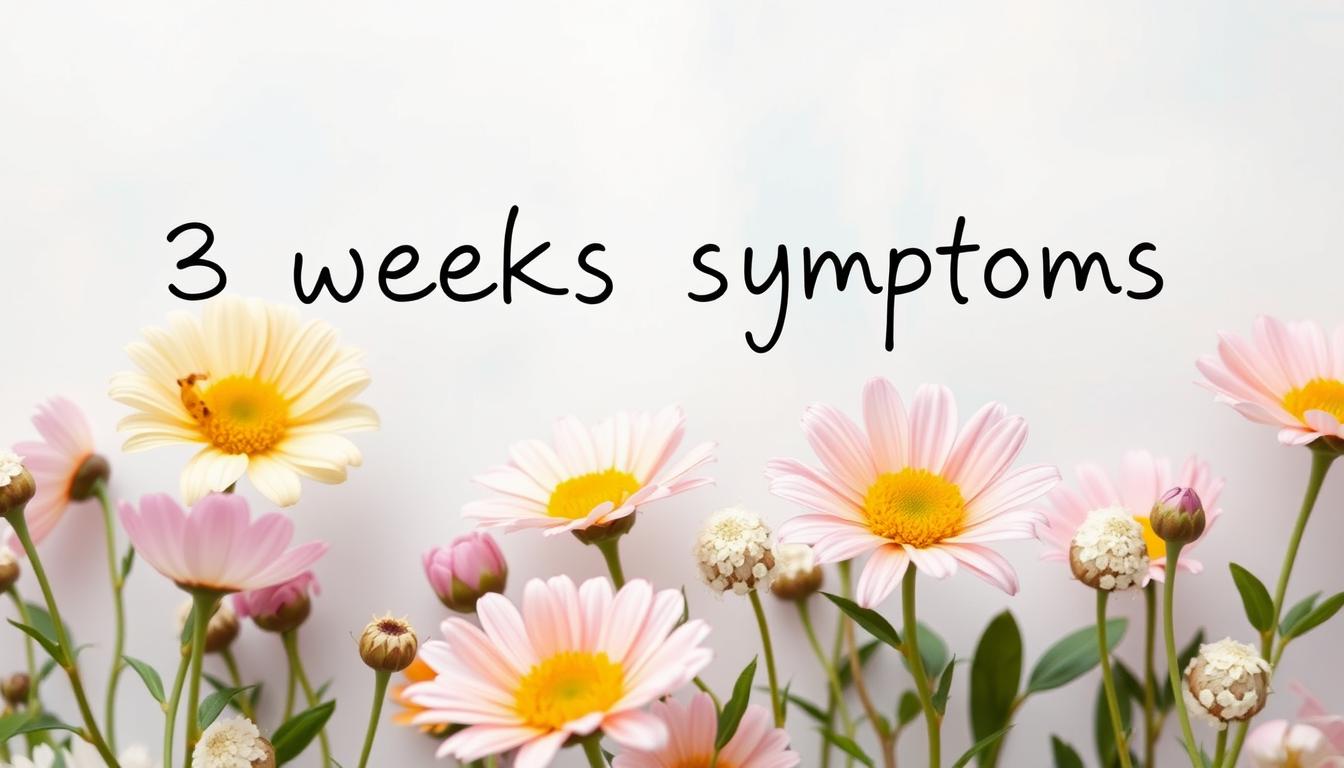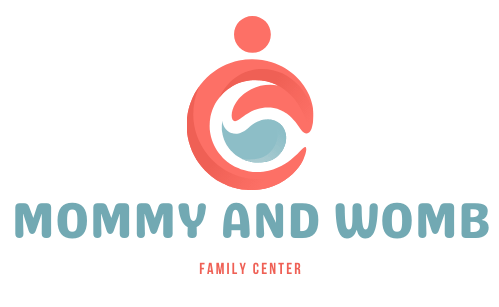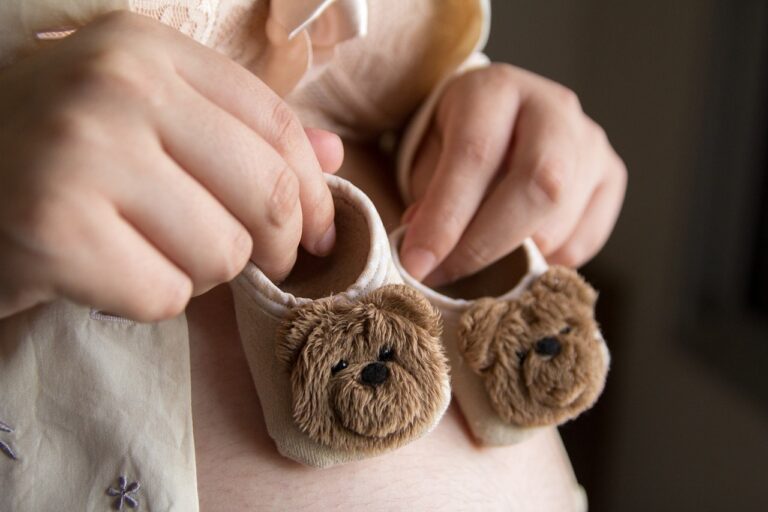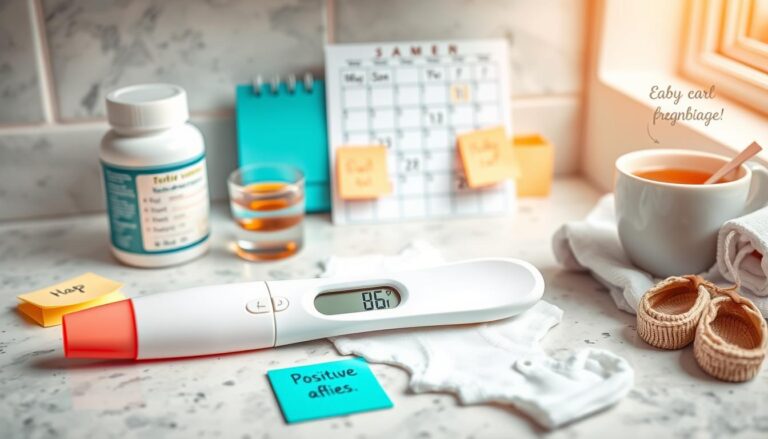3 weeks pregnant symptoms

Starting your pregnancy journey, the first few weeks are full of emotions, physical changes, and excitement. At 3 weeks pregnant, you’re in a special phase. The fertilized egg is on its way to the uterus, getting ready to implant. Even though symptoms might not be strong yet, knowing the early signs can give you peace and confidence.
Table of Contents
Understanding Pregnancy Week Three
Conception starts an amazing journey. In week three, fertilization happens. A sperm meets an egg, creating a zygote. This tiny cell cluster then heads to the uterus to implant.
Conception and Fertilization Process
The adventure begins when a sperm fertilizes an egg. Human eggs are tiny, about 0.1 mm, and wait in the fallopian tube for 12 to 24 hours. After fertilization, the zygote quickly divides, becoming a blastocyst in the first week.
How Pregnancy Dating Works
Pregnancy is dated from the first day of the last menstrual period. Home pregnancy tests can detect pregnancy about 21 days after conception. The blastocyst implants in the uterus five to six days after fertilization.
Calculating Your Due Date
Due dates are estimated as 280 days (40 weeks) from the last menstrual period start. But, each pregnancy is different. The mother’s age, health, and the baby’s growth rate can change the due date.
| Conception and Fertilization | Pregnancy Dating | Due Date Calculation |
|---|---|---|
| – Sperm fertilizes egg to form a zygote – Zygote divides and becomes a blastocyst – Blastocyst implants in the uterus | – Pregnancy dated from first day of last period – Most pregnancy tests detect hCG around 21 days after conception | – Due date calculated as 280 days (40 weeks) from last period – Actual delivery date may vary due to individual factors |
Understanding conception, pregnancy dating, and due dates is key in the early stages of pregnancy. Knowing these helps expectant parents prepare for the journey ahead.
Early Development of Your Baby
At just 3 weeks pregnant, the amazing journey of fetal development starts. The fertilized egg, or zygote, quickly turns into a ball of cells called a blastocyst. This tiny blastocyst, about the size of a full stop, will soon attach to the lining of your uterus. This marks the start of the embryo.
The embryo’s sex is decided at conception, but it’s too early to tell. Some cells will form the embryo, while others will become the placenta. The placenta will feed your growing baby. Folic acid is key during this time, helping prevent birth defects and supporting your baby’s spine.
As your pregnancy goes on, you’ll feel many changes. Between weeks 6 and 9, you might feel tired, have morning sickness, and notice thicker hair and tender breasts. By weeks 10 and 11, you’ll likely feel hungrier as your body supports your baby’s growth.
The first trimester is full of fast growth. By week 9, your baby is about 2.5 cm long, with eyelids, hands, feet, and a beating heart. Around weeks 10 and 11, you might see your baby for the first time during an ultrasound scan.
As you go through the early stages of pregnancy, take good care of yourself and your baby. Eating well, staying hydrated, and getting prenatal care will help make your pregnancy a positive experience.
Common Symptoms at 3 Weeks Pregnant
At 3 weeks pregnant, most women don’t notice symptoms yet. But, some may feel slight changes in their body. A missed period is often the first sign, but other signs include light spotting, tender breasts, and feeling tired.
Physical Changes
Light spotting or cramping might happen as the fertilized egg implants. Breast tenderness and swelling can start one to two weeks after conception. Also, some women notice more vaginal discharge, which is normal and helps prevent infections.
Emotional Changes
Emotional changes can start early, even at 3 weeks. Mood swings, irritability, and feeling more sensitive are common. Feeling tired is also common due to higher progesterone levels.
When Symptoms Typically Begin
Symptoms start at different times for everyone. Morning sickness usually starts between weeks 4 and 9, sometimes earlier. Frequent urination begins around 6 weeks as hormones increase. Symptoms vary greatly from person to person.
If you think you might be pregnant, take a home test and see your doctor.
Your Body’s Hormonal Changes
When you start your pregnancy journey, your body changes a lot. Conception sets off a series of hormones that help your baby grow and get your body ready for changes.
One of the first hormones you’ll hear about is human Chorionic Gonadotropin (hCG). This hormone comes from the placenta and can show up in your urine or blood 8 to 10 days after you conceive. hCG levels grow by half every two days in the first 10 weeks. They reach their highest point around 60 to 90 days into your pregnancy.
Progesterone is another key hormone. It’s made by the corpus luteum, a temporary gland in the ovary after ovulation. Progesterone levels go up a lot in the first trimester and then level off. The placenta starts making it around 10 weeks of pregnancy.
Estrogen, the main female sex hormone, is also important for pregnancy. The placenta makes estrogen, and its levels go up a lot during pregnancy. This hormone helps with the physical and emotional changes you might feel10.
Other hormones like relaxin and prolactin also change a lot during pregnancy. Relaxin, which is at its highest in early pregnancy9, helps get the uterus and cervix ready for childbirth. Prolactin, which goes up 10 to 20 times during pregnancy9, helps develop the mammary glands and make breast milk.
These changes in hormones can cause early pregnancy symptoms like nausea, tiredness, and changes in your sense of smell11. Knowing about these hormonal changes can help you get ready for and deal with the physical and emotional changes you’ll go through during this time.
Nutrition and Dietary Requirements
When you’re pregnant, your body needs more nutrients to help your baby grow. Eating a diet full of prenatal vitamins, folic acid, and other important nutrients is key for a healthy pregnancy diet12.
Essential Vitamins and Minerals
Start taking a prenatal vitamin with at least 400 micrograms of folic acid every day, even before you get pregnant. This helps prevent neural tube defects12. You also need more calcium, vitamin D, and iron during this time12.
Foods to Avoid
Stay away from raw or undercooked meats, unpasteurized dairy, high-mercury fish, and soft cheeses12. Also, limit your caffeine to less than 200 mg a day and avoid alcohol altogether12.
Hydration Tips
Drinking plenty of water is very important during pregnancy. Try to drink lots of water all day to meet your body’s increased fluid needs12.
| Nutrient | Recommended Daily Intake |
|---|---|
| Folic Acid | 600 mcg during pregnancy and breastfeeding |
| Calcium | 1,000 mg for pregnant adults, 1,300 mg for pregnant teenagers |
| Vitamin D | 600 IU per day |
| Weight Gain | 25-35 pounds for normal weight before pregnancy12 |
| Calorie Needs | 340 extra calories in 2nd trimester, 450 extra in 3rd trimester |
| Caffeine | Less than 200 mg per day |
| Alcohol | No safe amount identified, avoid consumption |
| Mercury in Fish | Limit white (albacore) tuna to 6 ounces per week |
“Proper nutrition during pregnancy is essential for the healthy development of your baby. By focusing on a balanced diet, staying hydrated, and avoiding potential risks, you can provide your little one with the best start in life.”
Important Lifestyle Modifications
Congratulations on your pregnancy! This exciting journey requires several lifestyle changes for your health and your baby’s well-being. Quitting smoking and managing stress are key to a better pregnancy experience.
- Quit smoking and avoid secondhand smoke. Smoking during pregnancy increases the risk of miscarriage, birth defects, premature birth, low birth weight, infant death, and learning disabilities.
- Eliminate alcohol consumption. Alcohol during pregnancy can cause fetal alcohol spectrum disorders, leading to disabilities13.
- Reduce caffeine intake to about one cup of coffee per day. Too much caffeine can affect the baby’s heart rate.
- Avoid hot tubs, saunas, and very hot baths to prevent overheating, dehydration, and fainting.
Creating a regular sleep routine is key. Pregnancy can make you tired, and enough sleep helps manage this. Also, try relaxation techniques, light exercise, or journaling to handle stress13.
Lastly, watch out for harmful chemicals, loud noises, or radiation at work or home. They can affect your pregnancy and your baby’s development. By making these changes, you’re focusing on your health and your baby’s. Remember, your well-being is crucial during this time.
Medical Care and Prenatal Support
Prenatal care is key for a healthy pregnancy and baby. Your first prenatal visit is usually around week 8, unless you have a high-risk pregnancy or health issues15. At this visit, your doctor will do a physical exam, look over your health history, and order blood tests.
Early tests might check your blood type, Rh factor, and for sexually transmitted infections16. It’s also important to talk about any medicines or supplements you’re taking.
Important Medical Tests
In the first trimester, you’ll have many tests to check your and your baby’s health. These include a CBC, blood typing, and tests for infections16. You’ll also have an ultrasound to find out your due date, often done vaginally.
Genetic tests are offered to look for birth defects and genetic issues, especially if you have a family history or are 35 or older. These include nuchal translucency and integrated screening for more accurate results16.
If you have a high-risk pregnancy, tests like CVS or cell-free DNA testing might be suggested as early as 10 weeks.
Going to regular prenatal visits is vital to watch your and your baby’s health during pregnancy. With the right care and support, you can start your baby’s life safely and healthily161715.
Safety Precautions and Considerations
Pregnancy is a delicate time. It’s important to keep the health and well-being of both the mother and the unborn child safe. As an expectant parent, being aware of pregnancy safety and environmental hazards is crucial.
One big concern is avoiding harmful substances. Exposure to lead, mercury, certain pesticides, and cat litter can be risky18. It’s wise to talk to your healthcare provider about any job hazards. Also, try to use natural cleaning products at home.
Good hygiene, especially handwashing, is key to avoiding infections that could harm the baby19. Be careful with physical activities. Avoid high-risk activities that could cause falls or harm to your abdomen.
- Limit exposure to harmful substances like lead, mercury, and certain pesticides.
- Opt for natural cleaning products and discuss occupational hazards with your healthcare provider.
- Practice good hygiene, especially handwashing, to prevent infections.
- Exercise caution and avoid activities with a high risk of falling or abdominal trauma.
By taking these steps, you can help ensure a healthy and pregnancy-safe journey for you and your baby. Remember, your health is the most important thing. Don’t hesitate to talk to your healthcare team for advice and support.
Preparing for the Journey Ahead
Starting your early pregnancy planning and pregnancy journey is exciting. Begin by researching prenatal care providers and birth settings. Choose options that fit your needs and preferences20.
Think about your maternity leave and childcare plans. This will help you feel more organized and in control. Start a pregnancy journal to track your experiences and milestones. Discuss your expectations and responsibilities with your partner20.
Look into local pregnancy support groups or classes. They offer valuable information, resources, and a sense of community. These can be great sources of advice and emotional support from others on a similar pregnancy journey20.
“Preparing for a baby is both exciting and overwhelming, but taking it one step at a time can make all the difference.”
This is a time to embrace changes, learn, and gather tools for the journey. With planning and self-care, you can confidently start this early pregnancy planning phase. Look forward to the incredible experiences ahead20.

Conclusion
Starting your 3-week pregnant journey is just the beginning of an amazing change21. You might not feel much different yet, but your body is getting ready for your baby. Focus on good early pregnancy care like taking prenatal vitamins, drinking lots of water, and getting enough sleep21.
The next few months will bring big changes, both in how you feel and in your emotions. The healthy pregnancy start you make now will help your journey be smooth and rewarding21. Know you’re not alone – the team at Pride IVF center in Delhi has helped over 1,500 couples like you21.
Every pregnancy is different, and it’s okay to have questions or worries. Always talk to your healthcare provider for advice and support. They’re there to guide you through this big change with care and confidence2223.
To read more about pregnancy in the third week, click on the link below
https://www.mommyandwomb.com/3-weeks-pregnant-2/
To read more about comprehensive pregnancy symptoms, click on the link below
https://www.mommyandwomb.com/pregnancy-symptoms/






